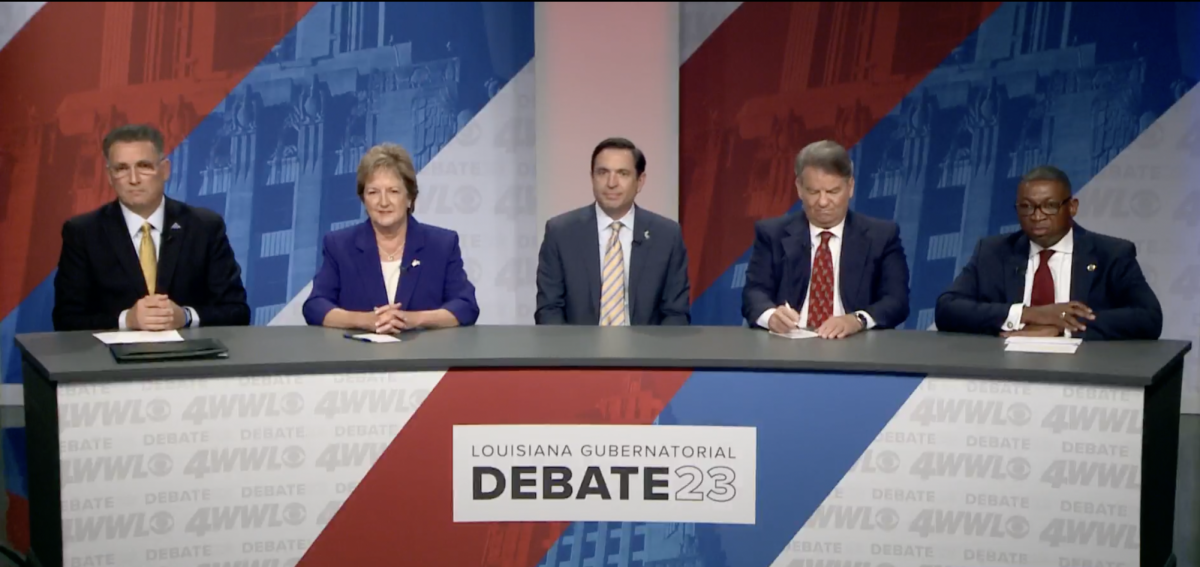On Thursday evening, New Orleans news station WWL-TV hosted and broadcast the first gubernatorial debate of the election cycle. Five of the seven candidates gathered in studio to discuss a multitude of issues affecting Louisianians.
The five candidates present for the debate were Democrat Dr. Shawn Wilson, the former head of the Transportation and Development Department; conservative independent Hunter Lundy and a trio of Republicans: State Treasurer John Schroder, State Sen. Sharon Hewitt (R-Slidell) and Stephen Waguespack, the former president and CEO of the Louisiana Association of Business and Industry.
Notably, the presumed gubernatorial favorite, Republican Attorney General Jeff Landry, declined to participate in the debate, citing his disapproval of The Urban League of Louisiana being a sponsor for the event. In his view, the civil rights organization is “biased” against his campaign and would’ve proposed unfair questions. While they were a sponsor for the event, they had no control over the questions asked.
Republican State Rep. Richard Nelson (R-St. Tammany), the fifth of the six conservative candidates, did not receive an invite due to low polling numbers.
The debate was the first in a series of four gubernatorial clashes leading up to the Oct. 14 primary. Landry has committed to the next debate in Lafayette on Sept. 15, which will be broadcast across the state by Nexstar Media Group.
Candidates took several swipes at Landry’s absence; in particular, Schroder scolded Landry for failing to “lead all of the people of Louisiana, not just the ones that agree with [Landry] politically,” and Lundy said police, firefighters and “800,000 single moms could care less if Jeff Landry’s here tonight.”
Beyond the attorney general, the hour-long debate unfolded without much fanfare; the only point of contention came when moderators asked how candidates would protect residents of Cancer Alley, the nearly 100-mile stretch of land from Baton Rouge to New Orleans plagued with chemical plants and pollution. The area houses “some of the sickest and poorest communities in Louisiana.”
The four candidates besides Waguespack said they’ll enforce legislation and make chemical plants accountable for their actions. Waguespack, on the other hand, focused on the job opportunities within Cancer Alley and said national folks are “[coming] down here and [disparaging]” the area. He remained steadfast in his answer, even after each moderator asked him for a direct response to the question.
The candidates were mostly united on a litany of other issues, including raising teacher pay, not raising the gas tax and closing the racial wealth gap. Every candidate besides Waguespack and Hewitt supported raising the minimum wage; Waguespack said he wouldn’t and Hewitt said “maybe.”
They straddled the party line on culture war issues such as the anti-trans laws passed in the legislature. All three Republicans and Lundy supported the gender-affirming care ban for minors, with Schroder comparing trans healthcare for youth to “an attack on the family.” Wilson criticized the legislature for focusing on “issues that infringe on people’s rights.”
Each of the four conservative candidates cited their pro-life beliefs for their disapproval of a potential abortion ballot measure in Louisiana, a referendum that has had widespread success across the U.S., including conservative states. Wilson vocalized his support for an abortion referendum, stating he has been the only candidate to support adding exceptions for incest, rape and the parent’s life to the trigger ban that took effect after the overturning of Roe v. Wade was announced.
“Many of the residents across Louisiana think we spend too much time talking about issues that won’t make us healthier…given the trigger laws that we have, [the laws] are putting lives in jeopardy,” Wilson said.
Their stances on racial issues were much less clear-cut. While each supported closing the racial wealth gap, only Lundy and Wilson firmly staked their support for the creation of a second majority-Black congressional district, while the three Republicans said they would follow “what the law says,” which depends on how the redistricting case fares in court.
Each candidate besides Waguespack was similarly tentative about their view on racial bias in the state police department. Moderators prefaced the yes-or-no question with the death of Ronald Greene, a Black man who was killed by state police officers in 2019. Lundy hesitantly answered yes, there is racial bias in the department, while Hewitt and Schroder said no but acknowledged there are a “few bad apples.”
Wilson walked back his initial “absolutely, yes” answer to affirm his support for the police. Waguespack said Greene’s death was a “horrific incident, but you can’t disparage the entire department because of [the incident].”
The next debate will be on Sept. 15 in Lafayette. Visit WWL-TV’s Facebook to watch the first debate’s full broadcast. For more information on registering to vote, head to the Secretary of State’s website.









